- Home
- Hammond Innes
Air Bridge Page 4
Air Bridge Read online
Page 4
He replaced the receiver slowly. “Was that Dick?” Carter asked.
Saeton nodded. “Yes. He’s had an offer for the aircraft and all the equipment here. He’s threatening to sell us up.” He picked up a stool and sent it spinning across the hangar. “God damn him, why can’t he understand we’re on the verge of success at last?”
Carter said nothing. I returned to my lathe. Saeton hesitated and then seized hold of the folder of specifications. For a moment he held it in his hands as though about to tear it across. His face was dark with passion. Then he flung it down and went over to the engine standing on its blocks against the wall. He pressed a switch and the thing roared into life, a shattering, earsplitting din that drowned all sound of my lathe. And he stood watching it, caressing it with his eyes as though all his world was concentrated in the live, dinning roar of it.
II
AS I WORKED at the lathe and the day wore on, it slowly dawned on me what an incredible stroke of luck I had had. It was as though I had been given another chance. And this was legal. I might not have taken Saeton’s word for it, but the presence of Tubby Carter proved there was nothing wrong with the set-up. He was so unquestionably honest. With him working beside me the whole thing became ordinary, matter-of-fact.
Saeton was different. It wasn’t that I didn’t trust the man. But he was a human dynamo, full of nervous, violent energy. The mercurial emotionalism of the Celt seemed mixed with a Saxon stolidity and singleness of purpose and I felt he was capable of anything. He was a born leader with that vital spark that can kindle enthusiasm in others, the type that can whip the dull heart of the mob into thundering passion. His strength was that he didn’t need the support of others. It was all there inside him. He showed that when he switched off the thundering din of that one engine and turned with a grim concentration to the job of winding the armature of a starter motor. The structure of his life was crumbling about him. His partner was selling him up. But he didn’t discuss it. He threw himself into the work that littered the bench with the silent preoccupation of a man who can see the finished article in his mind’s eye.
Something of his drive and purpose seemed to enter into the two of us as we worked beside him. And the fascination of seeing a part of a complicated machine take shape under my hands so engrossed me that I lost all sense of time. I didn’t notice Carter’s wife bring in our lunch. Saeton pushed a mug of tea and some sandwiches along the bench to me and I ate whilst I worked. He and Carter did the same.
The only interruption was just after we’d switched on the light plant, shortly after four. There was a banging on the door. Saeton shouted to know who it was and a voice answered, “The police.” I looked up at him from the lathe, my heart suddenly in my mouth. I had so completely lost myself in the work that the reminder that the authorities were searching for me came as a shock.
Saeton tossed me a flash mask. “Put that on,” he ordered crisply. “The oxy-acetylene equipment is at the end of the bench there.” I saw Carter looking at me curiously. Then I had the mask on and was hurrying across to the oxygen cylinders.
By the time Saeton came back with a police inspector and a sergeant I had the flame going and was cutting across a piece of scrap metal. “Just routine,” the Inspector said as he asked for our identity cards. He glanced at them idly, talking to Saeton all the time. “Thought we’d take a look round Membury before we packed it in. But he’ll be out of the district by now. Probably out of the country in some private plane. Still, we’ll just take a look round—in case. Quite a handy place, an old aerodrome, for a man to lie up.” He handed back our cards. “No fear of his pinching your plane, anyway, sir. Can’t fly a plane with two of its engines missing, can you?”
“No,” Saeton answered and he didn’t join in the Inspector’s good-humoured laughter.
They left then and I put the flash mask aside and got back to my lathe with a feeling that the last hurdle had been overcome. I was safe now. So long as I remained at Membury I was safe.
But as we worked on into the evening I was conscious of Carter watching me periodically from the other end of the bench. We knocked off at about eight. I was pretty tired by then and I might have felt depressed, but Saeton clapped his hand on my shoulder. “You’re a better acquisition than I’d dared to hope,” he said, and that word of praise lifted me above physical tiredness. “It’s a pity though,” he added.
“What’s a pity?” Carter asked.
“That Dick Randall doesn’t know anything about engineering,” he answered. “If he could understand just how much we’ve achieved in one single day with the three of us working without interruption for meal-getting, then he’d realise how close we are to success.”
It was cold outside the hangar and the biting north wind made the cut on my forehead ache as though the bone had been smashed. Back at the quarters there was a smell of roasting chicken. We cleaned ourselves up and then gathered in the front room. The trestle table had been covered. It was only an old curtain, but it gave it a more friendly air. The table was laid for four. Saeton crossed to a cupboard and brought out glasses and a bottle of whisky. “I thought you were broke,” Carter said.
Saeton laughed. “Only bankrupts can afford to be spendthrifts.” But though he laughed, there was no laughter in his eyes. “No point in hoarding when Randall may sell us up to-morrow.”
The click of high-heeled shoes sounded on the concrete of the passage outside and Saeton sprang to open the door.
Diana Carter was such a contrast to her husband that she produced in me a sense almost of shock. She was a product of the war, a hard, experienced-looking woman with a wide, over-thick mouth and hennaed hair. There was nothing homely about her. She swept in, a flash of red dirndl skirt and tawny hair with eyes that matched the green of her jersey and a motion of the body that was quite uninhibited. Her glance went straight to Saeton and then fell to the bottle. “What are we celebrating, Bill?” Her voice was deep and throaty with just the trace of an American accent.
“The fact that we’re broke,” Saeton answered, handing her a glass. “Randall’s selling us up to-morrow. Then you and Tubby can go and raise a family in peace.”
She made a face at him and raised her glass. “You’ll talk him out of it,” she said. “But I’ll need some curtains, tablecloths, bed-linen and china. I’m not going to live in a pig-sty. And we’re short of beds.” Her gaze had fastened on me. It was a curiously personal stare and her green eyes were a little too narrow, a little too close.
Saeton introduced us. Her eyes strayed to the adhesive tape across my forehead. But all she said was, “Where is he going to sleep?”
“I’ll fix him up,” Saeton answered.
She nodded, her gaze concentrated on him. “Two months, you said, didn’t you, Bill?” There was a sort of breathlessness about her that contrasted pleasantly with the essentially masculine atmosphere of the hangar. And the gleam of excitement in her eyes made me think she found it more interesting keeping house for three men on this lonely airfield than sharing a flat in London with a girl-friend. “Who’s the girl that comes with the milk and eggs in the morning?” she asked.
“Oh, she works at the farm,” Saeton answered carelessly. “Her name is Else.”
“She behaved more like a camp-follower than a land-girl.” She was looking at her husband as she said this, but then she switched her gaze back to Saeton. “Yours?”
“Really, Diana!” Saeton picked up the bottle and refilled her glass. “Have you managed to make the room opposite habitable?”
“After nearly a day’s work—yes. Was she cook here before I came?”
“She came in and did things for us in the evening sometimes,” Saeton admitted. “By arrangement with the farm.”
“I thought she looked at me like a cat that sees the cream whipped away from under its nose.” It wasn’t said banteringly. Her tone was hard and her eyes searched her husband’s face. “I guess I dug in my heels just in time.” There was a bitter clutching in h
er voice. She was the sort of woman who would always be wanting the thing that had just been put out of her reach. Slowly she turned and faced Saeton again. “Is she foreign? She has a queer way of talking.”
Saeton nodded. “Yes, she’s German. A D.P. Her name is Else Langen.” He seemed reluctant to talk about her. “Suppose we have some food now, Diana?”
She nodded and finished her drink. As she turned to go, she paused. “So long as I’m here tell her to confine her activities to outside help.”
Saeton laughed. “I’ll tell her.” And he went on chuckling quietly to himself after Diana had left the room, as though at some private joke.
To my surprise Diana proved to be a good cook. The meal was excellent, but before it was over the warmth of the oil stove and the whisky had made me drowsy. I’d had a long day and not much sleep the night before and as they were planning to start work again at seven, I decided to go straight to bed. Saeton fixed me up with a camp bed in one of the back rooms. But for a long time I lay awake, hearing the murmur of their voices. It wasn’t so much the cold that seeped up through the canvas of the bed that kept me awake as the fact that so much had happened since I had arrived at Membury. My mind was chock-full of half-digested impressions, all of them slightly fantastic, like a dream.
But the thing that stood out in my mind was that this was the beginning of a new life for me. I was safe up here at Membury. Whatever the future of Saeton’s outfit, it served my purpose. I’d stay here for a time and then, when the hunt had died down, I’d leave and get a job. I wouldn’t bother about flying. I’d go back to engineering. My day’s work had taught me that I was still an engineer, and there was no shortage of jobs for engineers.
The only thing that worried me as I drifted off to sleep was that Saeton’s company would pack up before it was safe for me to venture again into the outside world. All that seemed to stand between it and failure was the personality of the man. And yet, somehow, that seemed sufficient.
We breakfasted next morning at six-thirty. Diana got the meal for us, an old blue dressing-gown over her nightdress, her face freshly made-up. We ate in silence by the light of an oil lamp, the threat of foreclosure hanging bleakly over the table, like the reluctant daylight. Diana’s eyes kept straying to Saeton’s face as though searching for something there that she needed. He didn’t once look up. He ate with the fierce concentration of a man to whom the act of feeding is a necessary interruption to the day’s work. Tubby Carter, on the other hand, ate with a leisurely enjoyment.
As I went down the passage after breakfast to get my overalls, I passed an open door and paused at the sight of a bed made up on the floor in the far corner. Hanging on the wall was the jacket Saeton had worn the previous night. The man had given me his own camp bed. I don’t know whether this had any direct bearing on my actions later, but I know that at the time it made me feel part of a team and that from that moment I wanted Saeton to win out and get his plane on to the airlift.
There was no hesitation when we reached the hangar, no discussion. We went straight on with the jobs we had left the night before. But as we worked I was conscious of a mounting tension. Several times Saeton paused and glanced impatiently at his watch. A nerve twitched at the skin of his temple. But he worked steadily, unhurriedly, as though the day stretched ahead with absolute security.
Diana brought coffee shortly after eleven. She tossed the morning paper to me with a little secret smile and then turned to Saeton. “Well, he’s here.”
“Randall?”
“Yes.”
“Then why the devil didn’t you bring him up here with you?”
“I told him to wait. He’s talking to that girl from the farm. I thought you’d like to know he’s got someone with him.”
“Someone with him?” He jerked round towards her. “A man?”
“Yes.”
“What sort of a man?”
“Short, slightly bald, with glasses and——”
“I don’t want to know what he looks like. What’s his business?”
“I haven’t asked him.” She seemed to enjoy baiting him with the mystery.
“Well, what’s he look as though he does?” he asked angrily.
“He’s dressed in a dark suit and a Homburg. I guess he might be something in the City—a lawyer maybe.”
“A lawyer! My God! Don’t say he’s brought his solicitor with him. Go and tell them to wait. I’ll be down right away. And get rid of that girl.” He was scrambling out of his overalls, cursing softly to himself, as her heels click-clacked across to the door of the hangar. When he had his jacket on, he picked up a mug of coffee and drank it slowly as though steadying himself, controlling the violence that seemed on the verge of erupting from him. At length he turned to Carter. “We’ve got to convince him, Tubby,” he said in a tight, controlled voice.
The other nodded. “But don’t lose your temper, Bill, like you did last time. It only makes him stutter. If he were an engineer——”
“Well, he’s not an engineer,” Saeton snapped. “He’s just a jerk that’s been left fifty thousand by an adoring aunt.” He thrust his hands into his pockets. “All right. I won’t lose my temper—provided he shows some sense.” He turned then and walked quickly out of the hangar as though he were going to something unpleasant and wanted to get it over.
Carter watched him go and then shrugged his shoulders. “Trouble is, every time he meets Randall he acts as though he’s a steam hammer driving sense into a block of pig iron.”
“What’s Randall like?” I asked. I wasn’t really interested. This was none of my business. I had picked up the paper and was searching through it for a follow-up to the “Callahan” story of the previous day.
“Oh, he’s not a bad fellow really. Got more money than sense, that’s all.”
I had found what I wanted now, a paragraph on an inside page stating that the police believed “Callahan” had left the country. I folded the paper and laid it on the bench. There was nothing for me to worry about. I looked across at Carter. “Why does Randall want to sell up?” I asked.
Carter shrugged. “Bored, I suppose. He’s not really interested in aircraft. Horse racing is what he lives for. Besides, three years is a long time.”
I glanced at the plane and then back again to Carter. There was something here I didn’t understand. It had been at the back of my mind and now that I didn’t have to worry about myself any more it came to the fore. “It doesn’t take three years to get a plane into the air,” I said.
Carter looked up at me guardedly. “Hasn’t Saeton told you anything about these engines? I thought you were an old friend of his?”
I didn’t pursue the matter, but turned back to the lathe.
It must have been about half an hour later that Saeton came in, his face dark with anger. With him was a tall, erect-looking man with a brushed-up ginger moustache and rather prominent eyes. He wore tweed trousers and a cloth cap and the open neck of his sheepskin jacket was filled with a brilliant blue and gold silk scarf. Behind them trotted a soft, plump little man with a brief-case.
Saeton went straight over to Carter. “You can pack up work on that induction coil, Tubby. We’re through.” His voice was hard and vicious.
Carter sat back on his stool, still holding the coil in his hands as though he didn’t want to let it go, and stared at Randall unbelievingly. “Doesn’t he understand we only need two more months?” he asked Saeton. “With Fraser here——”
“I’ve told him all that,” Saeton cut in. “But we’re not dealing with Randall. We’re dealing with Mr. Reinbaum here.” He nodded to the plump little man whose white fingers were fidgeting with the lock of his brief-case. “He holds the mortgages.”
“I don’t understand,” Carter said slowly. “Those mortgages were given to Dick as security for money he advanced to the company. How does this fellow Reinbaum come into it?”
Randall cleared his throat awkwardly. “I borrowed money on the mortgages,” he said.
/> “Well, surely if you repay the money——”
“We’ve been over all this,” Saeton cut in impatiently. “Randall has lost heavily—betting.” The word came out with an explosive violence. “Reinbaum has received an offer for the plane and all our tools and equipment and Randall has agreed to close.”
“It is out of the question that we should receive a better offer,” Reinbaum said. He had a soft, slightly foreign voice.
“The offer,” Saeton said harshly, “is twenty-five thousand for the whole box of tricks. That’s just two thousand more than the mortgages.”
“But that means winding up the company,” Garter said. “Randall can’t do that unless one of us agrees. Together we out-vote him. Under the articles of the company——”
“Please, Mr. Carter,” Reinbaum interrupted. “It is not a question of voluntary liquidation.”
“You mean you’re going to force us into liquidation?” Carter asked and there was an obstinate note in his voice that made me suddenly respect him.
“The damnable part of it is,” Saeton said angrily, “that when Randall advanced us that last five thousand his solicitor insisted that since it was for material for building the engines, the engines themselves must be included in the mortgage.” He swung round on Randall. “By God!” he said. “If it wasn’t that I’d swing for it, I’d——” He turned quickly and started to pace up and down, his hands clenched as he fought down the fury that mottled his features. He stopped as he came face to face with the completed engine. Then he reached up to the wall and pressed the starter switch. The engine turned, coughed twice and roared into life. The hangar shook to the thundering din of it. He turned to Randall. “Come here, Dick,” he shouted. “Look at it! Feel the power of it! That engine is ready for installation.” He waved his thick hand at the bench. “The second is already taking shape. In a month it will be finished. In six weeks we’ll be on test. And on the 25th January, we’ll be on the airlift. In two months you’ll be director of a company owning the most talked-of plane in the world. Think of it! Saeton Aircraft freighter slashes fuel costs! My God, man, haven’t you any ambition? We’ll make a fortune, and all I’m asking you for is two months. You’ve carried the company for nearly three years. Another two months isn’t much to ask.”

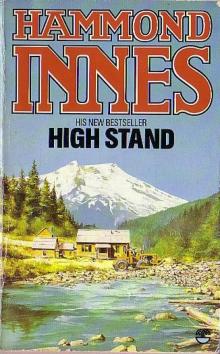 High Stand
High Stand The Doomed Oasis
The Doomed Oasis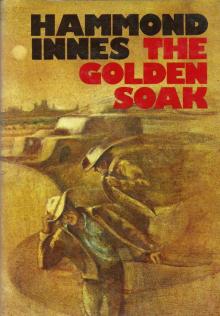 Golden Soak
Golden Soak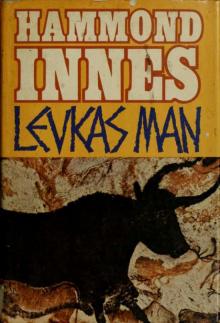 Levkas Man (Mystery)
Levkas Man (Mystery) The Strange Land
The Strange Land Dead and Alive
Dead and Alive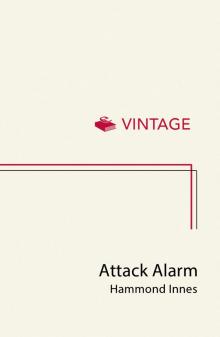 Attack Alarm
Attack Alarm The Strode Venturer
The Strode Venturer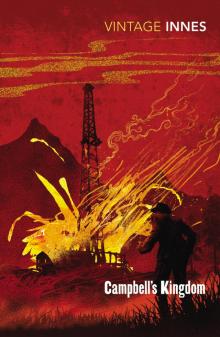 Campbell's Kingdom
Campbell's Kingdom North Star
North Star The Wreck of the Mary Deare
The Wreck of the Mary Deare The Lonely Skier
The Lonely Skier The Black Tide
The Black Tide The Trojan Horse
The Trojan Horse Medusa
Medusa Air Bridge
Air Bridge Maddon's Rock
Maddon's Rock The Angry Mountain
The Angry Mountain Wreckers Must Breathe
Wreckers Must Breathe Solomons Seal
Solomons Seal The White South
The White South